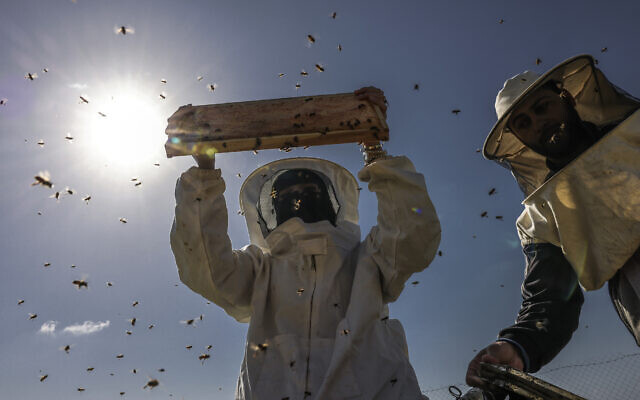Gazan beekeeper returns to colony along border after latest fighting
Though she says ‘the gases, rockets and dust as a result of the war’ kill Miassar Khoudair’s bees, the restive frontier is one of the few areas in the Strip suitable for beekeeping

JABALIYA, Gaza Strip — In a field close to the Gaza Strip’s restive frontier, apiarist Miassar Khoudair checks that her queen bee has survived five days of deadly cross-border fire between Palestinian terrorists and the Israeli army.
“The bees die from the gases, the rockets and dust as a result of the war,” said the 29-year-old, dressed in a protective white bee suit.
Ahead of World Bee Day on Saturday — which aims to raise the profile of these vital pollinators — Khoudair has returned to her colony just a few hundred meters from the border.
In the latest escalation in hostilities between Israel and Gaza’s terror groups, Khoudair was unable to access the hives amid outgoing Palestinian rocket fire and incoming Israeli airstrikes, with three or four of the apiaries destroyed.
Last week’s fighting began after the death in Israeli custody of a hunger-striking alleged Islamic Jihad terrorist a week earlier, after which the terror group fired over 100 projectiles at Israel. Starting early Tuesday, Israeli air strikes killed six top members of the Islamic Jihad terror group, and more than a dozen other alleged terror group members, among 33 Gaza fatalities. Islamic Jihad fired over 1,600 projectiles at Israel, and Israel said that at least four of the Gaza civilian fatalities were likely killed by failed rockets. Two people were killed in Israel — an elderly Israeli woman in her home in Rehovot and a Gazan worker.
Beyond the grass and trees surrounding Khoudair’s hives, a flag of Islamic Jihad flies in an adjacent field.

Despite the dangers, the frontier’s farmland offers some of the only areas in Gaza’s densely populated urban environment suitable for beekeeping.
“We always put them in border areas, because there are lots of trees and wild plants, and there aren’t many buildings or overcrowding,” she said.
The territory is home to some 2.3 million people, who have endured an Israeli-led blockade since the Islamist terror organization Hamas took power in the territory in 2007. Israel says the blockade is needed to keep arms from reaching Hamas and other terror groups.
Cross-border trade was halted until a ceasefire took hold last Saturday and the fighting also damaged an estimated 600 dunams (0.6 square kilometers or 0.2 square miles) of crops.
The value of losses to beehives, poultry farms and livestock reached $225,000, according to the Hamas-run government’s media office.
‘I rely on myself’
The conflict halted daily life and prevented Khoudair from selling honey at her store in a usually buzzing mall in downtown Gaza City.
Khoudair studied herbal medicine and as well as selling traditional eating honey, she also sells honey-based infusions to treat everything from problems of concentration to fertility issues.
“If the honey’s of high quality, it’s very treatable. There are some mixtures added to the honey, and here it treats childbearing,” she said, without elaborating.

Khoudair started her business a few months ago after studying honey and herbal medicine in Saudi Arabia, she said.
“While I was in Saudi, I found they have the idea of honey, their love for honey, their interest in honey, as a remedy and a supplement on the table to my lunch,” she said.

With 45 percent unemployment in Gaza, according to the International Monetary Fund, Khoudair’s bees provide her with a job.
“It’s a very beneficial project, and I rely on myself as a woman,” she said.
Standing beside her colony after inspecting her hives — resulting in a few stings to her hands — Khoudair urged people beyond Gaza’s borders to “care about the bees’ produce.”
“Honey was mentioned in the Quran, we take it therapeutically, not just in a nutritional way, and it’s healthy and strengthened with vitamins,” she said, above the drone of her bees.









